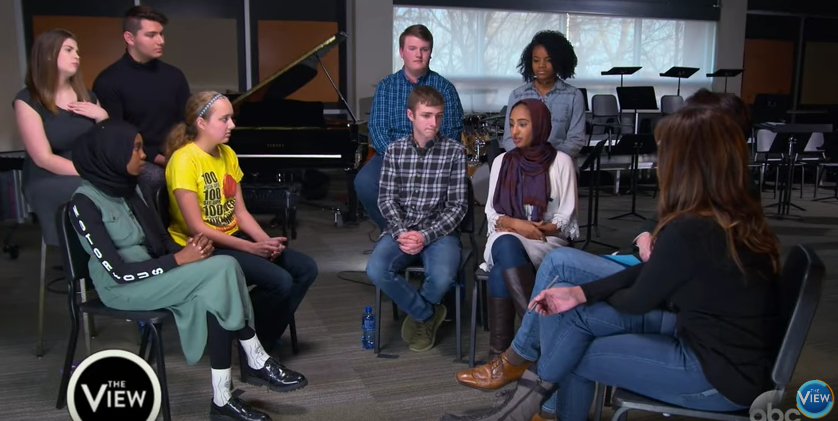Your donation will support the student journalists of West High School. Your contribution will allow us to purchase Scholarship Yearbooks, newsroom equipment and cover our annual website hosting costs.
Students react to ‘The View’s segment on West High
Twelve students give their two cents on what was featured on The View in last Monday's Martin Luther King jr. Day special.
January 25, 2017
The students sit in together in the North band room during a panel discussion held by The View. The View came to West on Jan. 6.
West High students appeared on national television in The View‘s MLK Day special on Monday, Jan. 16. The segment, which consisted of clips from one-on-one interviews with students and a 70 minute student panel, focused on student reaction to the 2016 election. The featured students, and Principal Gregg Shoultz, gave their reaction to what they believe The View got right and wrong.
Gregg Shoultz, principal: “They had left some good discussion on the cutting room floor.”
Shoultz was present for the one-on-one interviews throughout the day and observed the panel discussion.
West Side Story: What do you think is something they portrayed correctly?
GS: I thought they got the student angst right. All the students– everyone– was upset. The students were definitely upset at the outcome of the election, and not because of who won or lost, but because it was so different from what anyone thought. They got that right.
WSS: What is one or more things they got wrong?
GS: The thing I probably didn’t enjoy the most about [the segment in which] they said “a school in turmoil.” That characterization is just wrong.
WSS: How were you feeling, either day of or leading up to, that Friday that they came?
GS: I probably underestimated how much work it would take from my office or how much time I needed to spend with them to help with their production needs. That meant helping get the kids there. They needed a lot of help with location and timing of things so they weren’t in our way. So, keeping them out of their way was a little more of a hassle than I thought it was going to be. But that’s not what you asked, you asked how I was feeling–nervous anticipation, that’s my answer.
WSS: How did you feel when you saw the segment? Did you have a gut reaction to it at all?
GS: I didn’t have a really strong gut reaction. I had the opportunity to sit in with the students when they were doing the panel, so my reaction, I guess–I couldn’t divorce my previous opinion of what I had– but my reaction was that they had left some good discussion on the cutting room floor, that they’d left out some really interesting and good points the kids made in the hour and ten minutes they were interviewed.
WSS: Have you received any feedback from parents or teachers or otherwise?
GS: Not since it aired… I was going to say we had conferences, but we hadn’t yet, so I’d only talked about the process. I have gotten feedback from administrators and teachers and just a couple of parents and friends who had called me right afterward, and they all thought it portrayed the students pretty well, that they came off smart and involved.
WSS: At the end of the segment, Whoopi Goldberg said she would like to see this group of students meet every week after school to talk. Are you scheduling or anticipating to follow up on it with the students or otherwise?
I think they grew from it, from listening to each other.
— Gregg Shoultz, prinicpal
GS: I have a couple of thoughts on that. The discussion that took place I actually thought was positive, the hour and ten, twenty minute discussion, and it was neat for the students to participate in that. I think they grew from it, from listening to each other. I agree that it would be nice that to be able to construct that kind of thing, but it will be hard to recreate. I will definitely be looking for ways to recreate those kind of discussions. My other thought is that it would be interesting to get eight adults in a room and have that discussion, you know, because they’re not doing it. And my last one is that The View doesn’t really do that either, you know? They don’t involve a lot of contradictory points of view on their show. So, it’s a nice thing from Whoopi to say, but as she knows, it’s a harder to do, because they aren’t able to do it on the show.
WSS: If someone were to see that segment knowing nothing about West High, what else would you want them to know about the school or the students that are in it?
GS: I guess I would stress that they we’re able to have these eight students, and the ones they interviewed–I feel like I could’ve chosen any student to do that–that are able to hold their own in very heavy political discourse. That’s what I would like them to know.
Susie Mons ’17: “I think they did a good job portraying everyone positively.”
Mons participated in a one-on-one interview.
West Side Story: What is something you think the segment portrayed correctly?
SM: I think they definitely portrayed how our school has two sides to the issue snd I thought they did a great job showing how the conservatives here feel and how the liberals here feel.
WSS: What is one, or more things, they portrayed incorrectly?
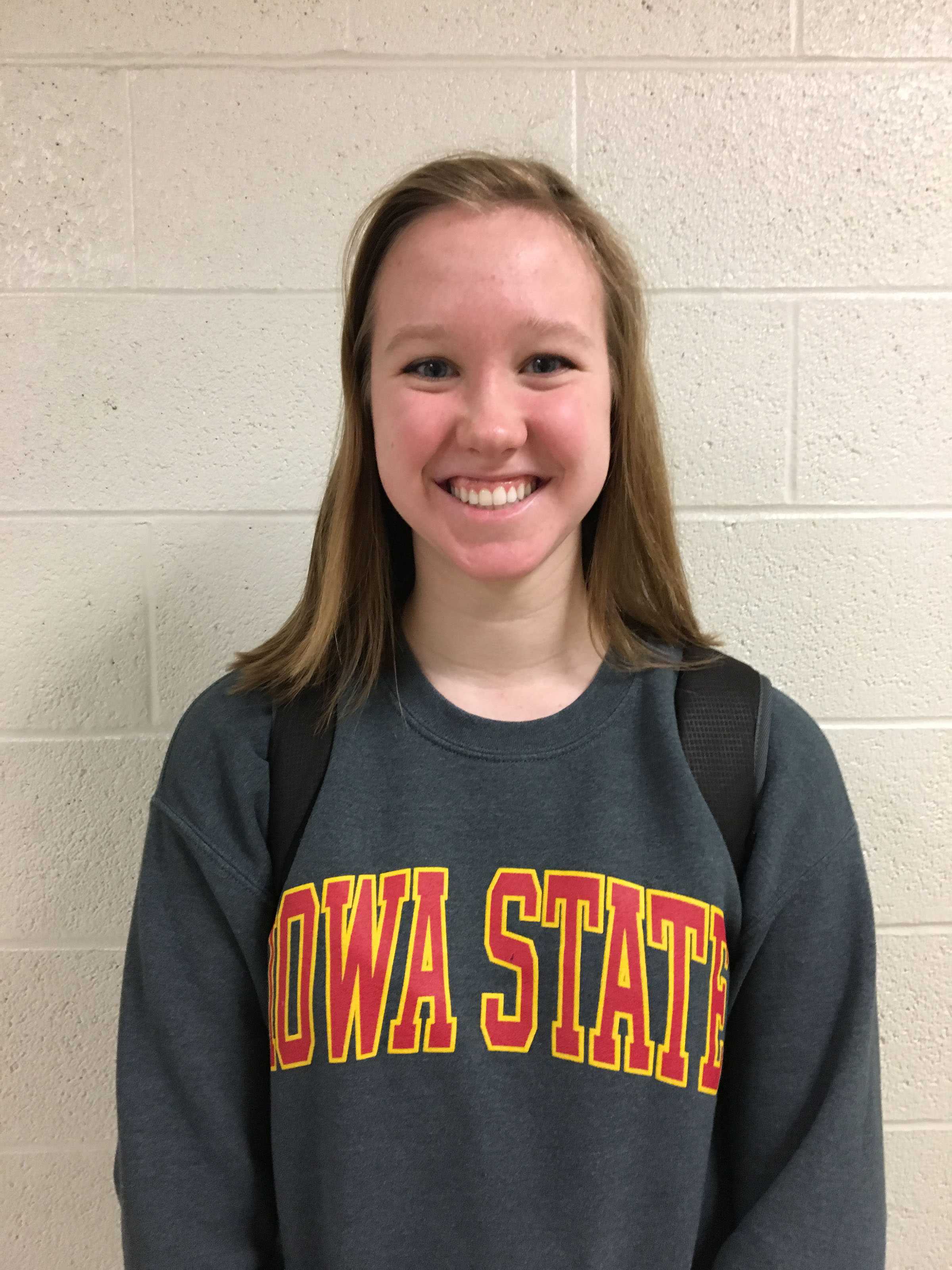
SM: I think they over-dramatized how divided our school is, like they used ‘a school in turmoil’ and I thought that was very dramatic, but now everyone has calmed down with time. It’s not as dramatic as they made it.
WSS: How did you feel before the segment came out?
SM: Honestly, I said yes to the interview because I didn’t think it was going to happen. And so, the day of the interview I was like ‘Oh. Heck yeah. Everyone is here. This is weird.’ I wasn’t super nervous because I knew I could stress my ideas well and not be nervous while I was expressing them, but I mean, I was nervous. It’s on TV, that’s a nerve-racking thing. But no, I was fine.
WSS: How did you feel afterward? Did you have an initial or gut reaction?
SM: I mean I kinda was excited because I was like ‘Wow, people my age are getting on TV for expressing their views’ and stuff like that. I was happy because I think they did a good job portraying everyone positively, not in a negative way. It was nice to see how well-spoken everyone was and it made me wish that every day, throughout our everyday life, people would be that well-spoken while talking to others. Because I think on TV you try to speak your best and try to articulate your ideas the best, and I think we need to take that and put it in our everyday lives. Then I feel like people would better express their ideas every day and not be as angry all the time, if that makes sense.
It was nice to see how well-spoken everyone was and it made me wish that every day, throughout our everyday life, people would be that well-spoken while talking to others.
— Susie Mons '17
WSS: Did you receive any feedback afterward from family, friends or on the internet?
SM: I got a lot of positive feedback, which was really awesome. A lot of people texted me and were like ‘Hey, way to speak up for your beliefs’ and ‘You sounded very intelligent and well-spoken’ which I really appreciated. It made me feel really good. I had one friend who texted me — we have vastly different views in the political world, but she was like… ‘I know we don’t agree on everything, but I’m really proud of you for sticking up for your views and articulating them well.’ That kind of meant the most to me just because I know, especially in Iowa City most people don’t have the same views as me, which is fine, that’s totally fine, but it was a really positive feeling to have someone who knows we don’t have the same views be like, ‘Hey, way to go and speak up for your views and be respectful.’ That made me happy.
Jade Merriwether ’17, Ala Mohammed ’17 and Jillian Baker ’18
Merriwether, Mohammed and Baker participated in one-on-one interviews and the panel discussion.
West Side Story: What is something they portrayed correctly?
JB: That we agreed on something.
JM: I think they set up the scenario correctly, like giving each of our perspectives of the election individually. We all came together. The setup was mostly consistent throughout the whole thing. What I anticipated was that they were going to do the group panel first and then cut to our individually segments, kind of like on reality T.V. when they have someone talking to the camera, but they didn’t do that. It was in order of how it was filmed which I was pleased about. Things weren’t taken out of context too much.
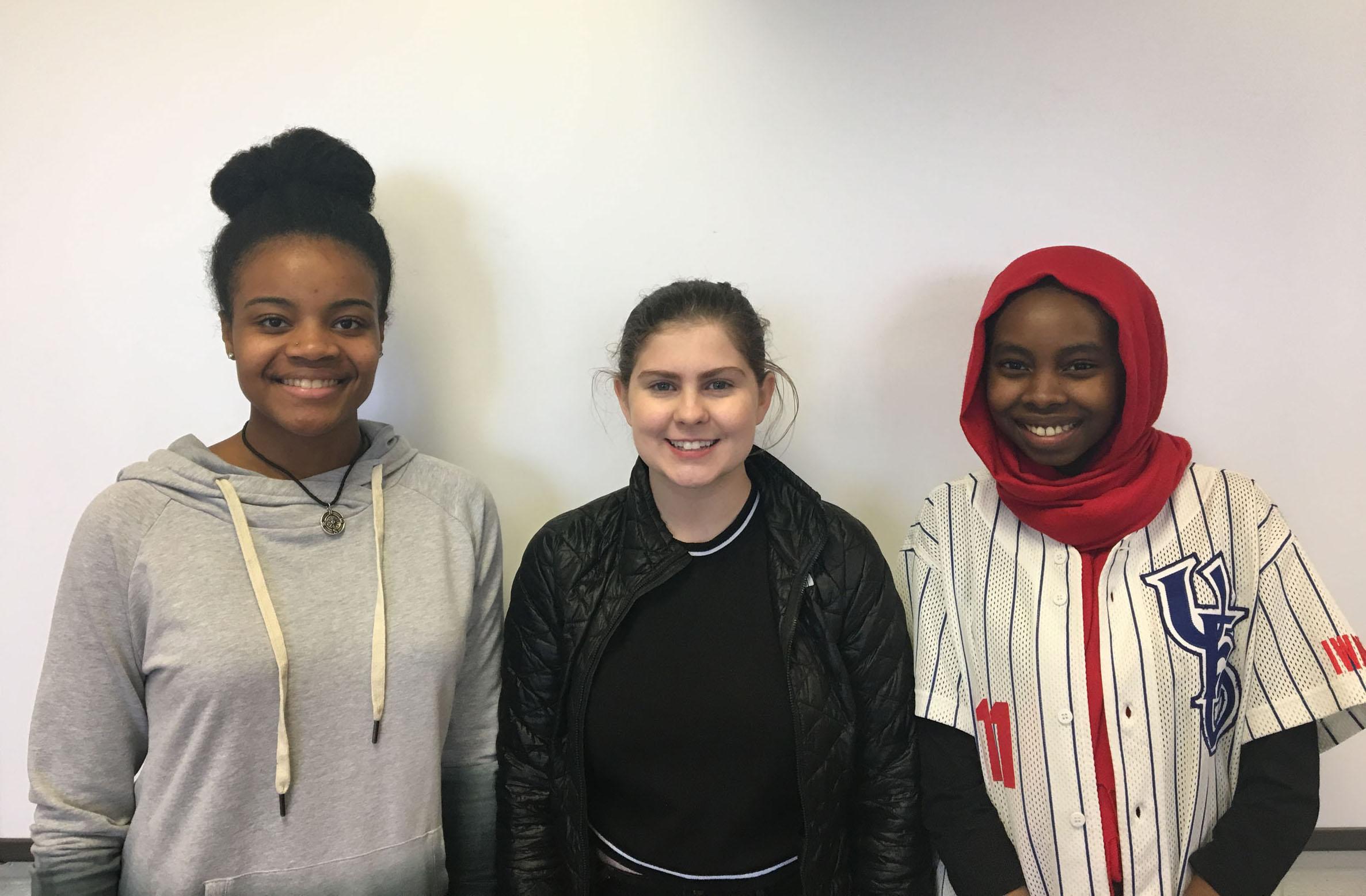
AM: They were able to get the view from both sides and they were able to get us to sit down and talk to each other. Usually, I would say I wouldn’t have personally talked to anyone like Mason because we don’t have anything in common, but they were able to bring us together and make us talk.
JB: They made it seem like we wouldn’t ever talk to anyone but I’ve talked to everyone [in the panel] before.
WSS: What is something they portrayed incorrectly?
JM: The drama. It definitely wasn’t half as dramatic as they made it seem.
JB: Yeah.
JM: Things had died down since the election but they told the story as if it was the day after the election when tensions were that high. They made us seem more divided than we are. We’re perfectly capable of having our own discussion, without adults, and they made it seem like we needed them to mediate, you know what I mean?
JB: They were like ‘Oh, yeah, West is one of the most divided schools in Iowa or in the country” and I was like, “Oh yeah, okay.” I mean West is pretty welcoming as it is. They really intensified it.
AM: I think they really portrayed my friend, Jayn, more aggressive than she is. A lot of people commented–and I know comments are not a thing and we shouldn’t care–but it hurts knowing people said stuff like “Oh, she’s mean” when they don’t even know her, don’t know what she’s been through. They don’t know how this election has been for her when she made [a comment about people supporting Trump] and she couldn’t believe them doing such a thing. And we aren’t a school in turmoil. I am totally capable of talking to Mason on my own, but we just don’t have anything in common so we just wouldn’t ever talk. Only if we are debating something as Republicans and Democrats.
WSS: How did you feel before The View came to film?
JM: I was fine then. Before they came, I just treated it as another interview because a lot of people have been asking us what we think about the election before The View came. So I tried to just remain calm and that kind of thing, but it’s sort of difficult when there are cameras in your face. The waiting time we experienced after they filmed it, before releasing it, was when I was most nervous.
JB: I didn’t ever view it as that big of a deal. Most of my family and friends hyped it up to be a lot bigger deal than I did. I just viewed it as a conversation that happened to air on TV, so I wasn’t really concerned before, during or after.
AM: Before I was really nervous. I know they had asked some teachers to participate but they had turned it down just because they didn’t know what they weren’t going to use and what they were going to use and make things more dramatic than they really are. I was kind of nervous because of that but I also had second thoughts because I’ve been told by my parents and my friends to read through the permission slip carefully. It just said they could use the clips however they wanted to and that’s just one of the things that made me a little nervous.
WSS: How did you feel afterward when it came out? Did you have a gut reaction to it at all?
JM: I don’t know, I said this in my post. While I was watching it I was really proud of us that we actually did that. And after it ended and they went on to the next topic I was just felt a mix of emotions on the way we were portrayed. Just like the flow of the conversation seemed off from the way it actually happened, so that part made me uncomfortable, but at the same time I was really proud of us for doing what we did.
JB: My initial reaction was just like “Oh” and then everyone was like “Oh, you guys did so well” and I thought about it and was like “Oh, that’s really cool that we, as a high school, got this opportunity.” But at the same time, I was [shaken by] the way they portrayed us. Otherwise, I felt indifferent about it. It’s kind of weird having people tell you they saw you on TV and you’re just like “Oh, yeah. Cool.”
AM: [Some comments they made] and everything under the video, [made me think] “Okay, whatever,” but some of them I thought, “You don’t even know us, [and you have the] audacity to say that.” Other than the comments, I felt that I was proud of us for doing what we did and being able to voice our opinions and how we felt, but I really disliked how they portrayed our school and how some of my friends had so many things to say, but they didn’t post it. They only had a four minute segment, but they were debating posting the whole [discussion], so I was just wondering if they were going to post the whole thing.
I felt that I was proud of us for doing what we did and being able to voice our opinions and how we felt, but I really disliked how they portrayed our school and how some of my friends had so many things to say, but they didn’t post it.
— Ala Mohamed 17
WSS: You guys kind of already spoke to this, but did you receive any feedback from family or friends, or things you saw online?
JB: They only showed a little bit of me, and the thing that they said wasn’t that controversial, so nobody really commented on me on YouTube. Family and friends were like “Oh, you did really well.” Somebody told me that I was brave because they couldn’t ever think about sharing their opinion without people being like “Oh, well I can’t be your friend anymore based on your opinion.” But, A, I’m probably not going to speak to half the people here before I graduate. And B, if somebody is that childish to ruin a friendship about that, I don’t really care. Either way, I was indifferent about it. I feel like people hyped me up way too much, honestly. It wasn’t that big of a deal to me.
JM: A lot of the reactions I’ve gotten from other people, especially through social media–Facebook and stuff–a lot of people were proud of us and understood our frustration, voiced their own frustration about the show was edited, produced and stuff. I haven’t heard of any negative backlash in real life. Notice how I said in real life, because people who are angered the most are the people that won’t say it to your face. I’ve been trying to stay off my phone and stuff and read comments, really any comments, unless someone tags me or something. I try to not look at it because at the end of the day, people are going to have their own perspectives on this. Whether they’re correct or not, it’s out of our hands now.
AM: We got a lot of support from teachers; a lot of teachers were proud of us. They say they are on our side, and a lot of community members were posting on Facebook, too, saying how they were proud of us as well. I did post one comment on YouTube and I got a lot of positive remarks. I just talked about how we should work together and fight hate. That’s what my friends and I were trying to do. We tried to lure it away from the election and Donald Trump [and talk] about how we need to work together as Republicans and Democrats and fight the hate both sides are dealing with. So, I got a lot of positive feedback; people were really happy with that comment.
Reporter’s note: Merriwether, Mohammed and Baker were interviewed together.
Mason Hanson ’18: “I was very surprised at how fairly balanced each side was portrayed.”
Hanson participated in a one-on-one interview and the panel discussion.
West Side Story: How did you feel before The View came?
MH: I was definitely nervous because I wasn’t sure how they were going to portray each side, whether they were going to shift it to favor a liberal mindset because a lot of the women on The View are very liberal, so I think that’s what I was mainly worried about.
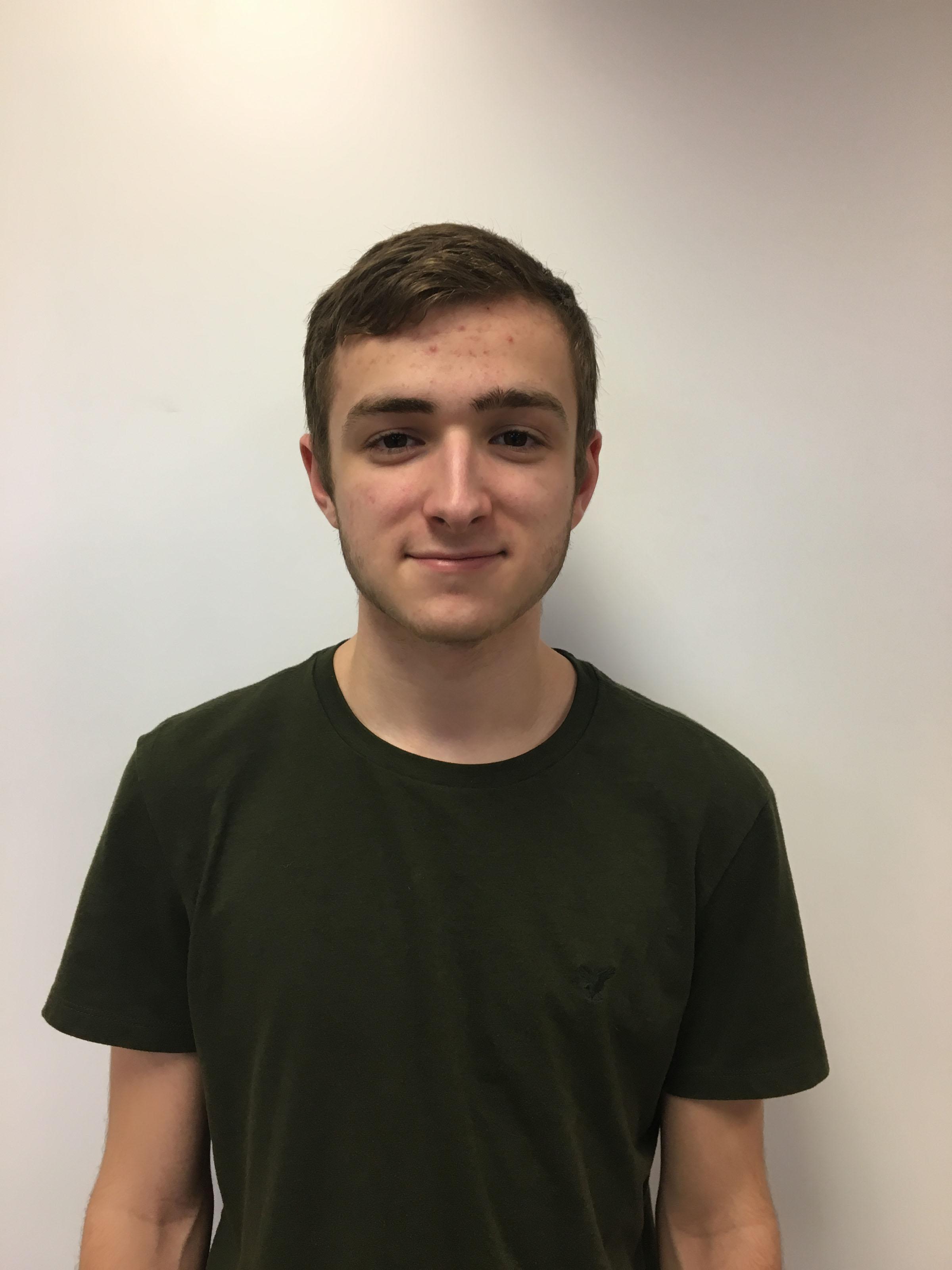
WSS: How did you feel afterward? Did you have an initial or gut reaction?
MH: After the segment came out I was very surprised at how fairly balanced each side was portrayed, but I was very upset in that they portrayed our school so much more divided than we are.
WSS: What is one thing you think the segment portrayed correctly?
MH: They didn’t make anyone sound like someone they were not.
WSS: What is something they portrayed incorrectly?
MH: Definitely how divided our school was. When Clay and Sunny were here they told us, including me, that this was one of the most diverse schools they have ever seen, and then on The View they were calling it one of the most divided schools in America.
WSS: Did you see any feedback afterward from family, friends or on the internet?
MH: There was a lot of feedback on the internet.
WSS: What did it say? Or did you pay attention to it?
MH: I did. I chose to be selective about it and not worry about it. Everyone who knows me has been giving me positive feedback. I’ve had random people bump into me in the hallway and say ‘Oh, by the way, thank you,’ like three people today alone have told me, that I’ve never met before, ‘Hey, you did great.’ So most of it has been positive, but there’s always going to be the haters.
Lujayn Hamad ’18: “Our school isn’t that divided.”
Hamad participated in a one-on-one interview and the panel discussion.
West Side Story: What is one thing you think The View portrayed correctly?
LH: I think they did portray our fears correctly, like how afraid we were, how everyone was afraid, I guess, of everything that would be portrayed post-election and everything that did happen post election.
WSS: What is one thing you think they portrayed incorrectly?

LH: Firstly, they made it seem like we were attacking the Republicans, that they were innocent, you know. I don’t think comparing our fears of harassment is the same as comparing their fears of judgment. Like a hat compared to a hijab. Also, our school isn’t that divided. I think they exaggerated that part a lot.
WSS: How did you feel before The View came on that Friday? Nervous? Excited?
LH: I was excited mostly. I was a little bit nervous, too, of what it would be. I’d never been in anything like that before.
WSS: How did you feel when it came out? Did you have a gut reaction to it?
LH: I was a little bit disappointed. I feel like they had potential and they took it to the wrong path. It could’ve been so much better. I guess it’s for views, you know.
WSS: Did you receive any feedback from family or friends or on the internet afterward?
LH: People were usually mostly agreeing with me about the part where you can’t compare the fear of being judged or losing friends to the fear of harassment– physical, verbal or anything. A hijab is not the same as a hat. You can take a hat off whenever you want. You are choosing [to wear it]. Other than that, it’s mostly been positive, people agreeing with me.
Nate Disterhoft ’17: “[Their choice of coverage] was surprisingly refreshing.”
Disterhoft participated in a one-on-one interview.
West Side Story: What is one thing you think The View portrayed correctly in the segment?
ND: I think they showed both sides very well, both sides being Republican and Democrat. I thought initially that the show would be mostly liberal views and hating on Trump mostly, but it was very bipartisan which was surprisingly refreshing.
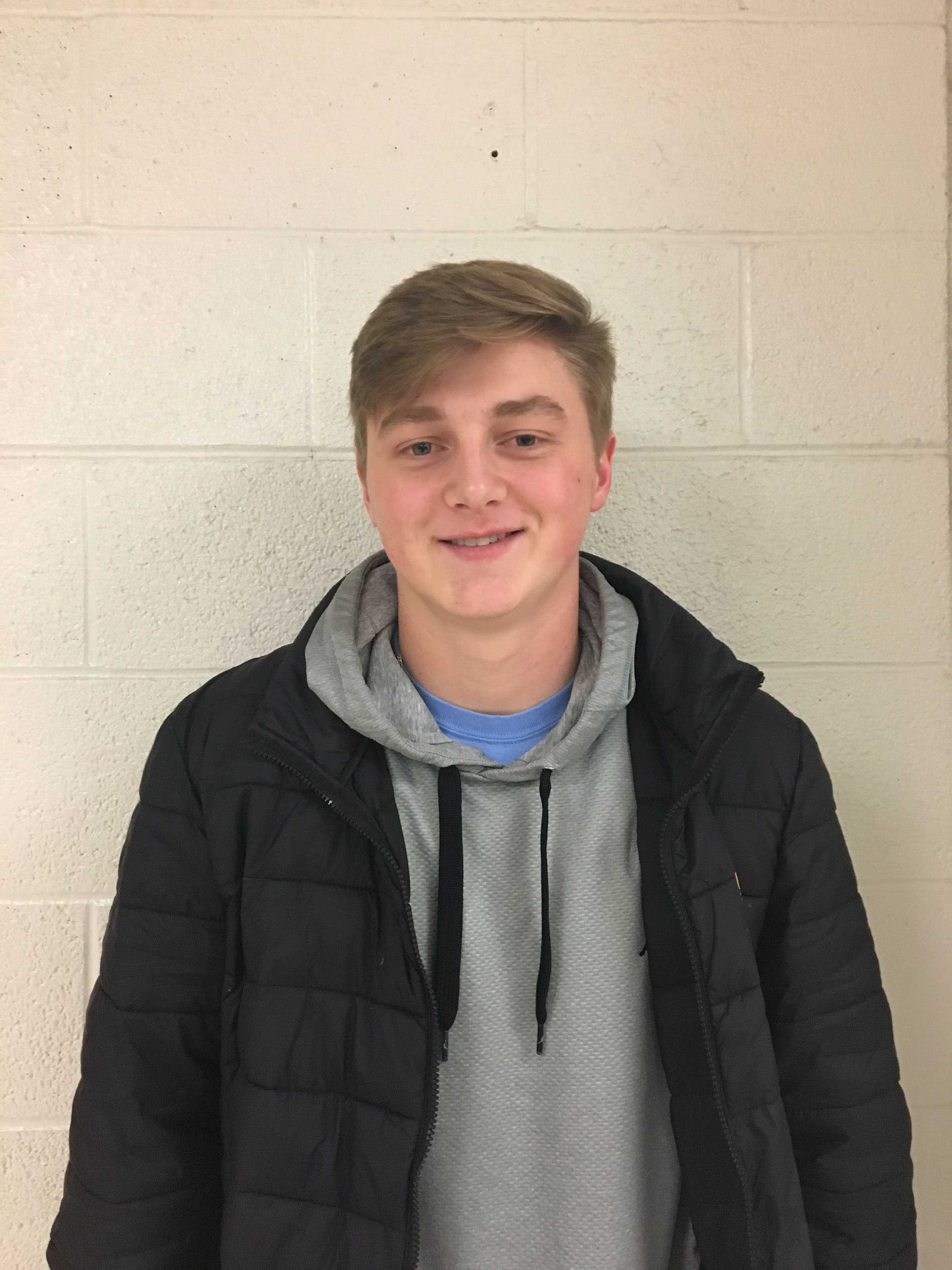
WSS: What is one thing you think The View portrayed incorrectly in the segment?
ND: I don’t think they necessarily portrayed anything incorrectly. I do think that some of the background music was a little dramatic which was amusing.
WSS: How did you feel before they came to school on that Friday? Nervous, excited?
ND: I thought it would be an interesting yet fun opportunity. Their timing somewhat confused me because the election occurred months before and they were just now coming to talk about it. But overall I think it was a great experience and I think they did a good job with it.
WSS: So you sort of already answered this, but how did you feel afterward? What was your gut reaction to the segment?
ND: I mean they didn’t really put all of our interview in it so it was interesting to see what parts they ended up putting into the show but I thought they did a nice job with it.
WSS: Did you receive any feedback from others after it came out?
ND: I mean, my friends have poked fun at what I said on the show and my parents told me I did well, but besides that no one has really mentioned anything. I mean I was fine with all of the comments I received.
Michael Moonjely ’17: “[The panel clips chosen] weren’t really representative of the constructive rhetoric and discourse that goes on daily at this school.”
Moonjely participated in a one-on-one interview.
West Side Story: What is one thing you think the segment portrayed correctly?
MM: I think they did a nice job showing how politically active [we are] and how much people care at this school about current events and the political climate post-election.

WSS: What is one, or more things, they portrayed incorrectly?
MM: I think the panel discussion was a little sensationalized in the sense that I heard from a lot of people after the discussion that it was a really constructive debate; however, at the end, they shortened down an hour discussion to a five minute back and forth which wasn’t really representative of the constructive rhetoric and discourse that go on daily at the school.
WSS: How did you feel before The View came?
MM: I was excited. I was more honored that I was chosen. I wasn’t that nervous because I knew what I wanted to say.
WSS: How did you feel after you watched it?
MM: So, I watched it live. I was impressed by the quality of the production, meaning the number of scenes. I think it could’ve been a longer segment, and I think, reading the comments on Twitter and all the YouTube comments on it, whether you agreed with the segment or disagreed with it, they wanted a longer piece, just so people could share their views in a better way.
WSS: Did you receive and feedback? How do you feel about the feedback you’ve seen?
MM: For me, I was only on for like ten seconds and I didn’t say anything controversial, but I did hear some things like ‘the school is not that bad” or ‘it’s not that divided or the most divided high school in America,’ but then, on the flip side, there were kids saying ‘this is representative of the school,” and to those people I just say “I could never put myself in certain people’s shoes, and it’s not really my job to say this is representative of people’s concerns, so I don’t think it’s fair to say that.”
Emma Peterson ’17: “The interviewers [were] obviously trying to get answers out of us to fit the message they were going for.”
Peterson participated in the panel discussion.
West Side Story: What was something you think they portrayed correctly in the segment?

EP: What they showed is what we said. Therefore, I don’t really think anything shown was portrayed incorrectly — this next part is me assuming the follow up question is asking what problems I had with it. I’m assuming what made a lot of people mad was the interviewers [were] obviously trying to get answers out of us to fit the message they were going for. Which is a message I agree with on some level. We are all fearing the same thing. The biggest difference though, and this difference is what has people angry; Muslims are being targeted because of their religious beliefs while Trump supporters are being targeted for their political beliefs. And for some reason it’s okay to target someone for their political beliefs but it’s bad if you target someone for their religious beliefs. Really the only issue I had was the lack of other parts shown. Particularly there was a point when Clay met Tony’s argument that if you support Trump you’re supporting everything he stands for with the fact that one of us went from supporting Bernie to Hillary and how Bernie’s free trade policies were different than Hillary’s, closer to Trump’s in fact. Therefore you don’t have to support everything a candidate supports. And also just us talking about the school walk off.
And for some reason, it’s okay to target someone for their political beliefs but it’s bad if you target someone for their religious beliefs.
— Emma Peterson '17
WSS: How did you feel after the panel, before the segment came out? For example, were you nervous? Excited?
EP: I was really nervous. My parents were getting the whole family and their friends in on it to watch. It was nerve-racking to think so many people will watch me on TV — and moreover, so many people online will see it. The YouTube video right now has almost 50,000 views. It didn’t help that the segment kept getting delayed.
WSS: How did you feel after it came out? What was your initial reaction?
EP: ‘That’s all?’ was my initially reaction. I was happy with it.
WSS: Have you seen any feedback from friends, family or on the internet? What did they say?
EP: They were all very positive. My favorite one was one of my friends saying ‘You were so savage.’
Collin Wicks ’18: “They showed how greatly effected kids were from the election.”
Wicks participated in a one-on-one interview and the panel discussion.
West Side Story: What is something you think the segment portrayed correctly?
CW: They explained every kid’s emotions correctly. They showed how greatly affected kids were from the election.
WSS: What is one, or more, things they portrayed incorrectly?
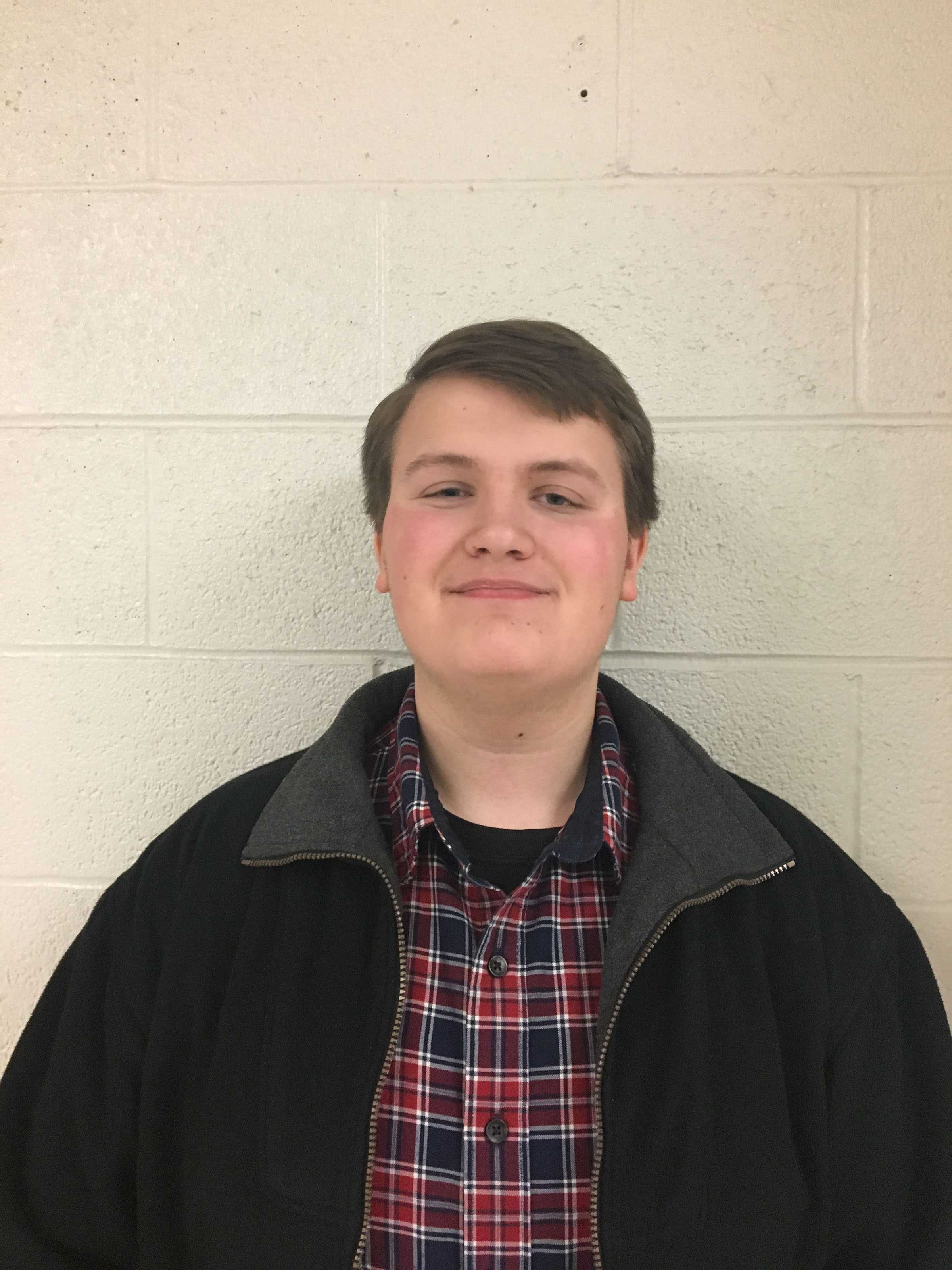
CW: I wouldn’t say incorrectly. More, I would say they didn’t explain well enough; they didn’t show that much, recording wise, of the group discussion. I think they should’ve shown more and explained our views more.
WSS: How did you feel before the segment came out?
CW: Kinda nervous because it was the first time I did something like this.
WSS: Did you feel better afterward, when the segment came out?
CW: I’d say so. Again, I wish they could’ve shown more, but I’d say they did it pretty well.
WSS: Did you receive and feedback afterward from family, friends or on the internet?
CW: Not yet.

